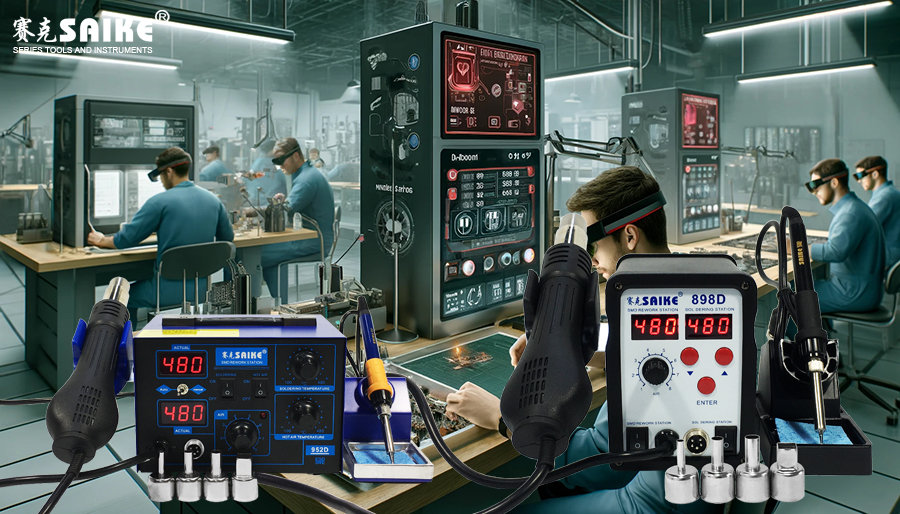
SK-YJ000RFCHT-KP 100010
Hot air rework stations play an irreplaceable role in electronic manufacturing and repair work, but when using these devices, proper personal protective equipment (PPE) is crucial to ensure operational safety. This article will explore the importance of PPE when using hot air rework stations and how to choose appropriate protective gear.
I. The Importance of Protective Equipment
1.Protecting Skin and Eyes:
– Hot air rework stations generate high temperatures during operation, and direct contact or close proximity to the hot air can cause skin burns. Additionally, the hot air may blow away soldering tin, flux, and other chemicals, which can cause severe eye irritation or injury if they come into contact with the eyes.
2.Preventing Inhalation of Harmful Fumes:
– Welding processes can release harmful fumes, and long-term inhalation of these fumes can damage the respiratory system. Proper protective measures can effectively filter or prevent the inhalation of these harmful substances.
3.Avoiding Hearing Damage:
– Although hot air rework stations typically do not produce high-decibel noise, continuous high-frequency operations in specific environments can affect hearing.
4.Electrostatic Protection:
– When handling sensitive electronic components, electrostatic discharge (ESD) is a significant threat. Using anti-static PPE, such as anti-static gloves and wristbands, can reduce electrostatic accumulation and protect electronic components from damage.
II. Choosing Appropriate Personal Protective Equipment
1.Protective Glasses or Face Shields:
– Select protective glasses or face shields that fully cover the eye area to block flying particles and chemicals when using a hot air rework station.
– For environments that may expose you to UV or other radiation, choose glasses with relevant protective functions.
2.Respiratory Protective Equipment:
– Select appropriate respiratory protective equipment based on the ventilation of the operating environment and the risk level of chemical substances. Use a respirator or mask with high-efficiency filtering capabilities in poorly ventilated environments.
– Masks with activated carbon filters can effectively filter harmful fumes and gases.
3.Protective Gloves:
– Use high-temperature resistant gloves, especially when frequent contact with hot components or handheld operations is required. These gloves provide not only heat protection but also some mechanical protection.
– Choose anti-static gloves to avoid electrostatic damage when handling precision components.
4.Protective Clothing:
– Wear anti-static protective clothing, especially when handling highly sensitive electronic products. This type of clothing can prevent electrostatic accumulation and protect the body from accidental chemical splashes and high temperatures.
5.Earplugs or Earmuffs (if applicable):
– Consider using earplugs or earmuffs to protect your hearing when operating in noisy environments.
III. Conclusion
Choosing and using personal protective equipment correctly is the safety foundation for using hot air rework stations. With appropriate protective gear, operators can not only protect their health but also improve work efficiency and quality. When selecting PPE, it is essential to choose equipment that meets safety standards and provides comfort based on the specific work environment and task requirements. Additionally, regular inspection and replacement of PPE are crucial steps to ensure continuous protection.


